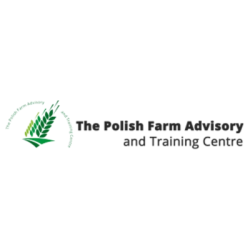
2025
https://farm-advisory.eu/en/
Level 3 (100-499)
176
1634
Łomżyńska 24, Miastkowo, 18-413, Poland
Click here to download

About The Polish Farm Advisory and Training Centre not-for-profit Sp. z o.o.
The Polish Farm Advisory and Training Centre not-for-profit Sp. z o.o. is a private not-for-profit organisation dedicated to providing farm advisory services, enhancing the entrepreneurial spirit in rural areas, and fostering the rural development in general. The organisation’s main goal is to improve the livelihoods of rural inhabitants by offering them the best and most professional and personalised advice in the field of agriculture as well as a variety of training courses and materials relevant to rural actors in the subjects of: environment protection, sustainability, food safety, green growth, permaculture. Another, particularly important aim of the organisation is promoting female entrepreneurship and sustaining women in business in the agri-food sector. The organisation believes that agriculture is one of the core drivers of economic growth in Poland, and therefore wants to contribute to the productivity and competitiveness of Polish rural areas. The Polish Farm Advisory and Training Centre pursues helping to create sustainable rural businesses, provide tailored education and training services in rural areas, enhance the profitability and revenues of farmers, and improve the vitality and quality of life in rural areas. Additionally, the organisation is engaging in non-formal education projects and would like to increase the general public’s awareness in the subjects of: agriculture and local food production, food waste, environment protection, and female entrepreneurship promotion. The Polish Farm Advisory and Training Centre encourages to popularise entrepreneurship among young people from rural areas and seeks to stimulate the concept of rural empowerment and agri-sustainability by promoting multifunctional farms and empowering farmers to process on-farm and sell their products directly to the consumer.
Achievements
PFA actively engages in numerous European projects, contributing to sustainable agricultural development across Europe. These initiatives include, among others: AI4Agri which provides cross-cutting knowledge and competencies on AI applications in agriculture by developing a Vocational Education and Training (VET) program for agricultural workers as well as existing and/or potential entrepreneurs on the field. The work packages cover the needs assessment, development of a training course, and policy recommendations. Other valuable initiative was the Farm4SD project aims at developing a holistic, innovative and inclusive approach to farmers’ and especially to medium and small farm holders’ training on the pillars of the sustainable agriculture. Furthermore, it enables the green and digital transformation of agricultural sector, but also develops a culture of sustainability and innovation among EU farmers and empower them by providing a set of cutting-edge training resources building on skills intelligence, available in digital and open media. Another important project is PermaVET aiming at increasing awareness about climate change among VET trainees in various sustainability-relevant sectors and at developing vocation-specific competencies in order to reduce energy use, save resources and process sustainable organic food. Trainees in cooking learn how to use and handle products from sustainable, ecological agriculture for a constantly growing business field. The curriculum gives them an additional qualification so that they can later work in catering establishments with ecological and healthy concepts. Last but not least is the AGROBIOTECH+ project aiming to help students make a smooth transition from academia to the agro-biotechnology industry by incorporating innovative learning and teaching practices as well as the Project-Based Learning approach. The participants will possess the required skills which will enhance the bio-economy, reducing the need for additional training and aiding the EU’s transition to a circular, low-carbon economy with greener, more efficient processes that safeguard biodiversity. This will be achieved by creating a training programme, a handbook, sharing success stories, but also piloting project results and organizing dissemination events.

